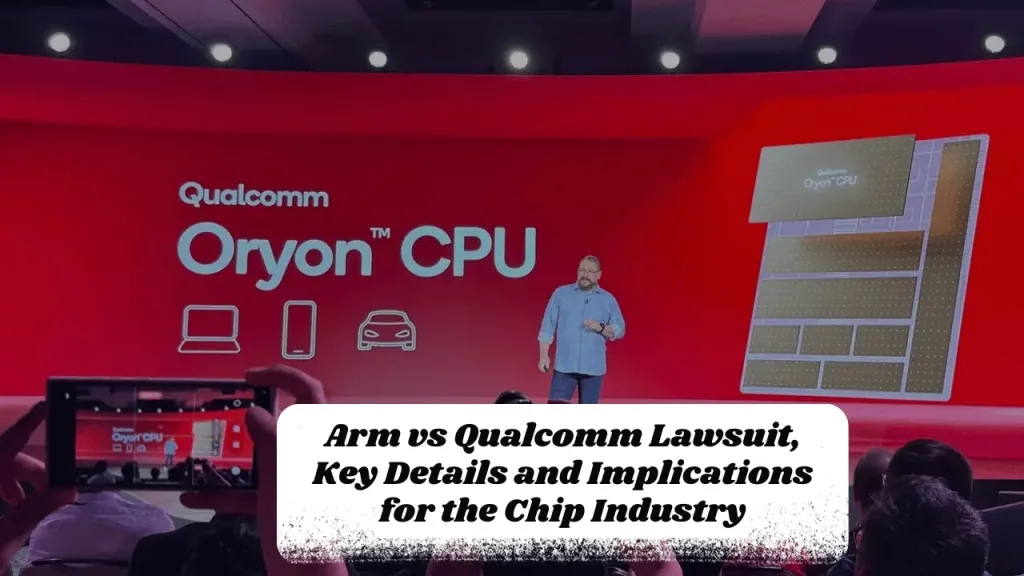Arm vs Qualcomm Lawsuit, Key Details and Implications for the Chip Industry
Qualcomm and Arm are embroiled in a high-profile legal battle over chip design licensing, with significant consequences for the tech industry. Here’s a concise breakdown of the dispute:
Background of the Lawsuit
- The Dispute: The conflict started after Qualcomm’s 2021 acquisition of Nuvia, a startup with custom Arm-compatible CPU designs.
- Arm’s Claim: Arm alleges Qualcomm didn’t secure proper consent to transfer Nuvia’s license and is using its intellectual property without approval.
- Qualcomm’s Defense: Qualcomm asserts that its existing license with Arm covers the use of Nuvia’s architecture, and no new agreement is needed.
Table of Contents
Key Legal Issues
- Breach of Contract: Arm claims Qualcomm violated their agreement by using Nuvia’s CPU design without Arm’s consent.
- Intellectual Property Infringement: Arm seeks to stop Qualcomm from using its IP and asks the court to destroy any infringing products.
- License Transfer Dispute: The core issue is whether Qualcomm was allowed to transfer the Nuvia license after the acquisition.
What’s at Stake
- For Arm: A victory could strengthen its position in licensing deals, but a loss could hurt its expansion plans, particularly in the Windows PC market.
- For Qualcomm: The outcome could disrupt its product roadmap, particularly for smartphones and PCs using Nuvia-based chips.
Related Articles For You:
Paragard IUD Lawsuit, Women Allege Injury Due to Device Breakage and Migration

Possible Consequences
- Court’s Role: If Arm wins, Qualcomm could be ordered to destroy products based on Nuvia’s design. This would have major repercussions on Qualcomm’s product lines.
- Potential Settlement: Analysts believe a settlement is the most likely outcome, as both companies have a lot to lose if the case goes further.
Trial Details
- Duration: The trial is set to last about one week, with key figures from both companies, including Arm CEO Rene Haas and Qualcomm CEO Cristiano Amon, testifying.
- Legal Framework: The case revolves around intellectual property laws, including the Patent Act (35 U.S.C. § 101 et seq.), which governs patent rights and licensing agreements.
FAQs
What is the Arm vs Qualcomm lawsuit about?
The lawsuit centers on Qualcomm’s 2021 acquisition of Nuvia, a startup with a chip design license from Arm. Arm claims Qualcomm did not obtain proper consent to transfer Nuvia’s license and is using its intellectual property without permission.
Why is Arm suing Qualcomm?
Arm is suing Qualcomm for breaching the licensing agreement and infringing on its intellectual property by using Nuvia’s chip designs without renegotiating the terms post-acquisition.
What is Qualcomm’s defense in the lawsuit?
Qualcomm argues that its existing licensing agreement with Arm is sufficient for the Nuvia acquisition and that it did not need additional consent to continue using the chip designs.
How could this lawsuit impact Qualcomm and Arm?
If Arm wins, Qualcomm may be forced to destroy infringing products, which could disrupt its chip production. For Arm, while it may win the legal case, it risks losing a significant customer and affecting its market position, especially in the PC market.
What is the current status of the lawsuit?
The lawsuit is in trial as of December 2024, with both companies presenting their cases in a Delaware court. The trial could last about a week, and a final judgment will depend on the court’s decision.
Could this lawsuit affect the tech industry?
Yes, the outcome could set precedents for intellectual property rights, licensing agreements, and mergers/acquisitions in the chip industry. It could also impact the development of AI and other next-generation technologies.
What is Arm asking for in the lawsuit?
Arm is not seeking financial damages but is requesting that Qualcomm destroy any products made using its intellectual property without proper licensing.
How does this lawsuit affect Nuvia’s technology?
The dispute is directly tied to Nuvia’s chip designs. If Arm wins, Qualcomm may be forced to halt using Nuvia’s technology in its products, including processors used in PCs and smartphones.
What are the potential outcomes of this case?
Possible outcomes include a court order for Qualcomm to destroy infringing products, a settlement, or an appeal if either party disagrees with the judgment.
Conclusion
The legal battle between Qualcomm and Arm could reshape the landscape of chip design licensing. A ruling in favor of Arm may force Qualcomm to reconsider its product strategies, while a victory for Qualcomm could pave the way for more aggressive use of custom chip designs in the tech industry.
Sources:
- Reuters, Arm and Qualcomm’s Legal Battle Link
- The Financial Times, Chip Groups Arm and Qualcomm Square Off in High-Stakes US Trial Link
About the Author

Sarah Klein, JD, is a licensed attorney and legal content strategist with over 12 years of experience across civil, criminal, family, and regulatory law. At All About Lawyer, she covers a wide range of legal topics — from high-profile lawsuits and courtroom stories to state traffic laws and everyday legal questions — all with a focus on accuracy, clarity, and public understanding.
Her writing blends real legal insight with plain-English explanations, helping readers stay informed and legally aware.
Read more about Sarah
